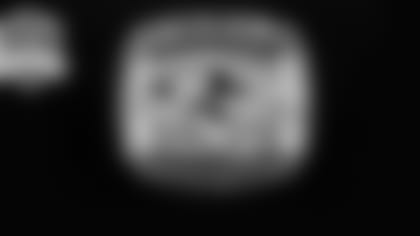During football season, Sundays are sacred. But before there were PSLs and Super Bowl parties, draft countdowns and pigskin-devoted channels, games overseas or even in 3D, satellite packages and the HD-TVs to air them, there was one momentous game that sparked America's love for professional football and the status it would achieve in the half-century to come.
"The Greatest Game Ever Played" (as it's now known) took place on Dec. 28th, 1958, a momentous day that changed the face of professional football. In the process, it rejuvenated a city with a chip on its shoulder. The Baltimore Colts, a team that at one point nobody wanted, beat the New York Giants 23-17 at Yankee Stadium in, with a national audience watching, the first overtime game in the history of the National Football League.
"If there were to be a monument to the modern NFL, it should be in Baltimore," said John Ziemann, the Deputy Director of the Sports Legends Museum, Band President of the Baltimore Marching Ravens and a lifelong Baltimore sports fan. Fifty years after the Colts beat the Giants and were named champions of the world, fans still talk about it; the players still remember it; and the NFL still celebrates it.
As iconic of a game in NFL history that it was, it is ironic that many of the players involved didn't see it that way.
"That wasn't our best game," said Hall-of-Fame running back and former Colt Lenny Moore. "We felt that we had them, and the score could have been 21-3 going into the half." Moore referred to a potential scoring play near the end of the first half that the Giants successfully stopped due to a Colts error.
There were many errors throughout the game, however. Passes fell incomplete, interceptions were thrown, field goal kicks were missed and fumbles were lost. Still, Moore believes his team could have ultimately crushed the Giants, but thanks to many twists and turns, it evolved into a thrilling battle.
Then again, "maybe it wouldn't have been as significant," Moore said.
Moore was just one major piece of a Colts team that would change history. Also among them was defensive end Gino Marchetti, wide receiver Raymond Berry, defensive tackle Art Donovan, fullback Alan Ameche and legendary quarterback Johnny Unitas. Baltimore had the lead going into the fourth quarter when Giants running back Frank Gifford scored to give New York the lead. With two minutes left, "Johnny U" successful led his team down the field to score the game-tying field goal.
"That was sort of the beginning of the two-minute drill," Moore observed.
With the game tied at 17 and no time left, "nobody knew what to do," according to Moore. He remembers the referees huddling, and being told to go out for the coin flip for sudden death.
"[We weren't aware] of any rules or plans in place for overtime," he said.
New York ultimately won the coin toss, but would have to punt it to Baltimore one more time. Unitas helped cement his legacy by driving the length of the field one more time, with Ameche punching it in for the clinching score.
The Baltimore Colts had become world champions. But what made this event all the more significant was that it was being broadcast in front of a national audience on NBC. The country was captivated by what, until then, had been the lesser of the sports leagues.
"It was baseball, basketball, and then us," Moore said. He agrees, though, that the extra attention was beneficial. "This was the game that really shot us up," he said.
Ziemann explained how before this game, football was just something to pass the time before baseball started, which was the true national pastime back then. "Once this game came along," he noted, "it all reversed."
But as important as the '58 Championship game was for the league, it was just as important for the city of the champion team.
"Before that game, Baltimore was a city that everyone made fun of. It was a stop between New York and Washington," said Ziemann, who was 11 at the time. He noted that before they were the Colts, they were the Dallas Texans, a team that had difficulty finding a home.
"You had a team that nobody wanted, and a city with an inferiority complex, that grouped together," Ziemann observed, explaining how the city adopted an 'us against the world' mentality. "The love between the city and team just grew. And then when this little team from Baltimore beat up on the Giants, it was just like David and Goliath."
"That's when Baltimore said 'we can do anything,'" Ziemann said with pride. It was the same pride 50 years ago that helped inspire the city to begin reinventing itself, renovating the downtown area the following year, according to Ziemann.
"Baltimore was ahead of the game," he noted, saying that besides Baltimore, no other city had really embraced football. "Baltimore had the first cheerleading unit in the NFL. They had the first organized fan clubs (the Colts Corrals). They had the first live mascot and they were the second team to have a marching band."
Ziemann would go on to be a member of the Baltimore Colts' Marching Band from 1962 to 1995, when he became the president. He helped keep the band together after the Colts went to Indianapolis in 1984, and when the Ravens arrived, the band rolled over and become the Baltimore Marching Ravens.
"Nobody thought it would take on this splendor," Moore said with a chuckle. "I still don't get it."
"Baltimore was involved with something special," according to Ziemann. "There are hard working people here. [That game] was the foundation of the modern NFL, and Baltimore and New York were the keystones."
Ziemann and Moore have seen it, just as millions of NFL fans have over the last 50 years. The NFL has evolved into a culture unto itself, and all the elements were in place on that fateful afternoon in December.
Ziemann sighed with a sense of pride. "It was the beginning of something great."


















